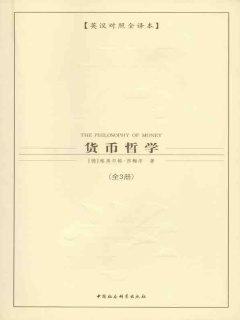商业
类型
可以朗读
语音朗读
1674千字
字数
2007-08-01
发行日期
展开全部
主编推荐语
本书为德国社会学家、哲学家西梅尔的论著,为英汉对照全译本。
内容简介
本书市是西梅尔一部结构完整的大部头论著,1900年完成。以一种独特的文化视角,对货币这一现象进行了深入、透彻的现代性分析。阐释了西方发达社会的与货币相联系的经济现象和社会现象,打破了之前同类著作以分析货币的社会经济机制为重点的常规,把货币及其制度化的发展对现代人们文化生活的影响作为全书的要旨。
目录
- 货币哲学(一)
- 版权信息
- 出版说明
- CHAPTER 1 Value And Money
- I
- Reality And Value As Mutually Independent Categories Through Which Our Conceptions Become Images Of The World
- The Psychological Fact Of Objective Value
- Objectivity In Practice As Standardization Or As A Guarantee For The Totality Of Subjective Values
- Economic Value As The Objectification Of Subjective Values
- An Analogy With Aesthetic Value
- Economic Activity Establishes Distances And Overcomes Them
- Ⅱ
- Exchange As A Means Of Overcoming The Purely Subjective Value Significance Of An Object
- In Exchange, Objects Express Their Value Reciprocally
- The Value Of an Object Becomes Objectified By Exchanging It For Another Object
- Exchange As A Form Of Life
- Theories Of Utility And Scarcity
- Value And Price
- Ⅲ
- Economic Value And A Relativistic World View
- The Epistemology Of A Relativistic World View
- The Construction Of Proofs In Infinite Series
- The Objectivity Of truth As Well As Of Value Viewed As A Relation Between Subjective Elements
- Money As The Autonomous Manifestation Of The Exchange Relation
- Analysis Of The Nature Of Money With Reference To its Value Stability, Its Development And Its Objectivity
- Money As A Reification Of The General Form Of Existence According To Which Things Derive Their Significance From Their Relationship To Each Other
- 第一章 价值与货币
- 第一节
- 实在和价值作为彼此独立的范畴,通过它们,我们的观念成为世界的图像
- 客观价值的心理事实
- 作为主观价值总体的标准化或保证的事件客观性
- 作为主观价值客观化的经济价值
- 与美学价值的类比
- 经济行为既创建距离又征服距离
- 第二节
- 作为超越客体主观价值意义之手段的交换
- 在交换中,客体相互表现彼此的价值
- 一个客体的价值通过与另一客体的交换而被客观化
- 交换作为一种生活形式
- 实用和稀缺的理论
- 价值和价格
- 第三节
- 经济价值和一种相对论的世界观
- 一种相对主义世界观的认识论
- 在无穷系列中的证据建构
- 真理的客观性和价值的客观性一样被看作某种主观因素之间的关系
- 货币作为交换关系的自主表现
- 根据货币价值的稳定性、货币的发展和客观性对货币性质的
- 货币是存在的普遍形式的一种具体化,据此,事物从它们的相互关系中得到自己的意义
- CHAPTER 2 The Value Of Money As A Substance
- Ⅰ
- The Intrinsic Value Of Money And The Measurement Of Value
- Problems Of Measurement
- The Quantity Of Effective Money
- Does Money Possess An Intrinsic Value?
- The Development Of The Purely Symbolic Character Of Money
- Ⅱ
- Renunciation Of The Non-monetary Uses Of Monetary Material
- The First Argument Against Money As Merely A Symbol
- The Second Argument Against Money As Merely A Symbol
- The Supply Of Money
- Reality And Pure Concepts
- Ⅲ
- The Historical Development Of Money From Substance To Function
- Social Interactions And Their Crystallization Into Separate Structures
- Monetary Policy
- Social Interaction And Exchange Relations:Money's Functions
- The Nature Of The Economic Circle And Its Significance For Money
- The Transition To Money's General Functional Character
- The Declining Significance Of Money As Substance
- The Increasing Significance Of Money As Value
- 第二章 货币的物质价值
- 第一节
- 货币的内在价值和价值的度量
- 度量的问题
- 有效货币的量
- 货币拥有内在价值吗?
- 货币纯粹的符号化特征的发展
- 第二节
- 对货币质料非货币使用的放弃
- 反对货币作为一种符号的第一个理由
- 反对货币仅是符号的第二个理由
- 货币供给
- 现实性与纯概念
- 第三节
- 货币从物质到功能的历史发展
- 社会互动及其结晶为独立结构
- 货币政策
- 社会互动与交换关系:货币的功能
- 经济循环的本性及其对于货币的重要意义
- 货币向其一般性功能特征的过渡
- 货币的物质性意义的下降
- 货币价值意义的上升
- 货币哲学(二)
- 版权信息
- CHAPTER 3 Money In The Sequence Of Purposes
- I
- Action Towards An End As The Conscious Interaction Between Subject And Object
- The Varying Length Of Teleological Series
- The Tool As Intensified Means
- Motley As The Purest Example Of The Tool
- The Unlimited Possibilities For The Utilization Of Money
- The Unearned Increment Of Wealth
- The Difference Between The Same Amount Of Money As Part Of A Large And Of A Small Fortune
- Money's Congruence With Those Who Are Marginal
- Ⅱ
- The Psychological Growth Of Means Into Ends
- Money As The Most Extreme Example Of A Means Becoming An End
- Money As An End Depends Upon The Cultural Tendencies Of An Epoch
- Psychological Consequences of Money's Teleological Position
- Greed And Avarice
- Extravagance
- Ascetic Poverty
- Cynicism
- The Blasté Attitude
- Ⅲ
- The Quantity Of Money As Its Quality
- Subjective Differences In Amounts Of Risk
- The Qualitatively Different Consequences Of Quantitatively Altered Causes
- The Threshold Of Economic Awareness
- Differential Sensitivity Towards Economic Stimuli
- Relations Between External Stimuli And Emotional Responses In The Field Of Money
- Significance Of The Personal Unity Of The Owner
- The Material And Cultural Relation Of Form And Amount
- The Relation Between Quantity And Quality
- 第三章 在目的序列中的货币
- 第一节
- 主客体之间的有意识互动的目的性活动
- 目的序列的不同长度
- 工具作为被强化的手段
- 货币: 最纯粹的工具
- 货币使用的可能性的无限性
- 财富的自然增值
- 一大笔财富中与一小笔财富中的等额数量的货币之间的差别
- 货币与边缘事物的一致性
- 第二节
- 手段变为目的的心理发展过程
- 目的序列中的货币: 货币作为手段变成目的的最极端的例子
- 作为一种目的的货币的特性取决于时代的文化趋向
- 货币目的论地位的心理后果
- 贪财和吝啬
- 奢侈
- 禁欲式的贫困
- 犬儒主义
- 乐极生厌的态度
- 第三节
- 货币的量即为货币的质
- 风险机率的主观差异
- 由于量变的原因造成质的不同结果
- 经济意识的临界点
- 对经济刺激的差异感受性
- 在货币领域中外部刺激和情感反应的关系
- 所有者的人格统一性的意义
- 形式与数量在物质和文化上的关系
- 质与量之间的关系
- CHAPTER 4 Individual Freedom
- Ⅰ
- Freedom Exists In Conjunction With Duties
- The Graduations Of This Freedom Depend On Whether The Duties Are Directly Personal Or Apply Only To The Products Of Labour
- Money Payment As The Form Most Congruent With Personal Freedom
- The Maximization Of Value Through Changes In Ownership
- Cultural Development Increases The Number Of Persons On Whom One Is Dependent
- Money Is Responsible For Impersonal Relations Between People
- Ⅱ
- Possession As Activity
- The Mutual Dependence Of Having And Being
- The Dissolving Of This Dependency By The Possession Of Money
- Lack Of Freedom As The Interweaving Of The Mental Series
- Its Application To limitations Deriving From Economic Interests
- Freedom As The Articulation Of The Self In The Medium Of Things
- The Possession Of Money And The Self
- Ⅲ
- Differentiation Of Person And Possession
- Spatial Separation And Technical Objectification Through Money
- The Separation Of The Total Personality From Individual Work Activities
- The Development Of The Individual's Independence From The Group
- New Forms Of Association Brought About By Money
- General Relations Between A Money Economy And The Principle Of Individualism
- 第四章 个体自由
- 第一节
- 自由和义务是并存的
- 自由的程度取决于义务是直接针对个人的还是针对劳动产品的
- 货币支付作为与个人自由最相符的形式
- 所有权的交换引起了价值的最大化
- 文化的发展增加了人们可以依赖的人的数量
- 对于人与人之间非个人的关系而言,货币是可以依赖的
- 第二节
- 占有是一种行动
- 拥有和存在的相互依赖
- 通过对货币的占有,这种依赖关系被消除了
- 自由的缺乏是精神序列的相互交织
- 把不自由应用于源自经济兴趣的局限性
- 自由是在对事物的占有中形成清晰的自我
- 对货币的占有和货币对自我的服从
- 第三节
- 个人与财产占有的分化
- 由货币导致的空间分离和技术客观化
- 总体的个性与个体劳动分离开来
- 个体从集体中独立
- 货币带来了新的联合方式
- 货币经济与个人主义原则的一般关系
- 货币哲学(三)
- 版权信息
- CHAPTER 5 The Money Equivalent Of Personal Values
- I
- Wergild
- The Transition From The Utilitarian To The Objective And Absolute Valuation Of The Human Being
- Punishment By Fine And The Stages Of Culture
- The Increasing Inadequacy Of Money
- Marriage By Purchase
- Marriage By Purchase And The Value Of Women
- Division Of Labour Among The Sexes, And The Dowry
- The Typical Relation Between Money And Prostitution
- Marriage For Money
- Bribery
- Money And The Ideal Of Distinction
- Ⅱ
- The Transformation Of Specific Rights Into Monetary Claims
- The Enforceability Of Demands
- The Transformation Of Substantive Values Into Money Values
- The Negative Meaning Of Freedom And The Extirpation Of The Personality
- The Difference In Value Between Personal Achievement And Monetary Equivalent
- Ⅲ
- ‘Labor Money’And Its Rationale
- The Unpaid Contribution Of Mental Effort
- Differences In Types Of Labour As Quantitative Differences
- Manual Labor As the Unit Of Labor
- The Value Of Physical Activity Reducible To That Of Mental Activity
- Differences In The Utility Of Labor As Arguments Against‘Labor Money’
- 第五章 个人价值的货币等价物
- 第一节
- 偿命金
- 对人的估价从功利主义的向客观的、绝对的估价的变迁
- 罚金与文化发展阶段
- 货币越来越明显的不充分性
- 买卖婚姻
- 买卖婚姻与妇女价值
- 男女性别的劳动分工,以及嫁妆
- 货币与卖淫现象的典型关系
- 为钱而结婚
- 贿赂
- 货币与区分的理念
- 第二节
- 从内容确定的权利向支付货币需求的转化
- 需求的强制性
- 实物价值转化为货币价值
- 自由的负面意义和个体性的彻底消除
- 个人劳动成果与货币等价物之间的价值差异
- 第三节
- “劳动货币”及其基本原理
- 无偿的脑力劳动成果
- 劳动量的差异所导致的劳动类型的不同
- 体力劳动作为计算劳动的单位
- 脑力劳动的价值简化为体力劳动价值
- 劳动实用性的差异作为反对“劳动货币”的观点的论据
- CHAPTER 6 The Style Of Life
- Ⅰ
- The Preponderance Of Intellectual Over Emotional Functions Brought About By The Money Economy
- Lack Of Character And Objectivity Of The Style Of Life
- The Dual Roles Of Both Intellect And Money:With Regard To Content They Are Supra-Personal
- The Dual Roles Of Intellect And Money:With Regard To Function They Are Individualistic And Egoistic
- Money's Relationship To The Rationalism Of Law And Logic
- The Calculating Character Of Modern Times
- Ⅱ
- The Concept Of Culture
- The Increase In Material Culture And The Lag In Individual Culture
- The Objectification Of The Mind
- The Division Of Labour As The Cause Of The Divergence Of Subjective Arid Objective Culture
- The Occasional Greater Weight Of Subjective Culture
- The Relation Of Money To The Agents Of These Opposing Tendencies
- Ⅲ
- Alterations In The Distance Between The Self And Objects As The Manifestation Of Varying Styles Of Life
- Modem Tendencies Towards The Increase And Diminution Of This Distance
- The Part Played By Money In This Dual Process
- Credit
- The Pre-eminence Of Technology
- The Rhythm Or Symmetry Of The Contents Of Life
- The Sequence And Simultaneity Of Rhythm And Symmetry
- Analogous Developments In Money
- The Pace Of Life, Its Alterations And Those Of The Money Supply
- The Concentration Of Monetary Activity
- The Mobilization Of Values
- Constancy And Flux As Categories For Comprehending
- Money As The Historical Symbol Of The Relative Character Of Existence
- 第六章 生活风格
- 第一节
- 通过货币经济实现的理智功能对情感功能的优势
- 生活风格的缺乏特征性及客观性
- 理智与货币的双重角色:关于二者超越个体的内容
- 理智与货币的双重角色:关于个人主义和利己主义的功能
- 货币与法律、逻辑的理性主义的关系
- 现代的算计特征
- 第二节
- 文化的概念
- 物质文化的上升和个体文化的滞后
- 思想的物化
- 劳动分工是主客观文化之间彼此分歧的原因
- 主观文化偶尔的优势
- 货币与这些相对立运动的载体的关系
- 第三节
- 自我与事物之间距离的变化——千差万别生活风格的表现
- 距离增大和距离缩小的现代趋势
- 货币在这一双向发展过程中发挥的作用
- 信贷
- 技术的奖励
- 生活内容的节奏或对称,及其对立面
- 节奏与对称的前后相继和同时并存
- 货币作为节奏与对称的类似物、作为其载体的发展
- 生活以及货币供给的速度与变化
- 金钱往来活动的集中
- 价值的现金化
- 恒定和运动:理解世界的范畴,这两个范畴在存在的相对性中的综合
- 货币是存在的相对特性的历史象征物
- 译者后记
展开全部
出版方
中国社会科学出版社
中国社会科学出版社成立于1978年6月,是由中国社会科学院创办并主管的以出版人文社会科学学术著作为主的国家级出版社。1993年和1998年先后荣获中共中央宣传部和国家新闻出版总署授予的全国优秀出版社称号。1993年第一批荣获中共中央宣传部和国家新闻出版署授予的全国优秀出版社称号。

